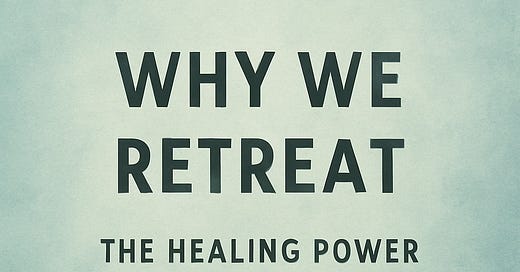Chapter 7: Why We Retreat: The Healing Power of Solitude
From the THX Series Hub - Behind the Mask: The Invisible Labor of Neurodivergent Survival
There’s a myth that neurodivergent people isolate because they can't connect.
The truth is much deeper—and far more compassionate.
Many of us retreat not because we don’t crave connection, but because the cost of constant emotional labor becomes too heavy to bear.
Solitude isn’t absence.
It’s sanctuary.
It’s the only space where we aren’t masking, managing, regulating, or translating.
It’s the only place where our nervous systems can stop bracing for misunderstandings, microaggressions, or subtle losses.
It’s not avoidance.
It’s repair.
What Solitude Provides
Security — No external emotional threat.
Ease of Use — No translation, no double-processing, no filtering.
Clarity — No guessing what others expect or feel.
Resources — Emotional energy is spent on self-repair, not external regulation.
Closure — Internal feedback loops can complete without interruption.
Alone, we access utilities that often fail in social systems.
THX Frameworks Behind the Healing Power of Solitude
12 Utilities — Solitude restores Access, Clarity, Security, Ease of Use, and Resources.
PERMAH — Positive Emotion, Meaning, and Health begin to regenerate without external extraction.
Micro-Moments — Solitude fills the space with neutral or positive micro-moments of self-connection.
Prospect Theory — Loss risk disappears; flourishing becomes possible.
Admiration Equation — Self-admiration (Skill, Goodness, Awe, Gratitude) can be rebuilt without emotional betrayal.
The Emotional Landscape
Relief — No emotional hypervigilance.
Reconnection — With personal rhythms, thoughts, and needs.
Replenishment — Energy not drained, but restored.
Recalibration — Emotions, thoughts, and goals realigned without external distortion.
Solitude isn’t loneliness.
It’s emotional sobriety.
It’s where we remember who we are when no one is asking us to be anything else.
Final Thought
We retreat not to hide from the world. We retreat to heal from it.
Because flourishing isn’t just about being brave enough to stay visible. It’s about being wise enough to know when visibility is costing you too much.
Solitude isn't failure. It's survival—and it's sacred.




